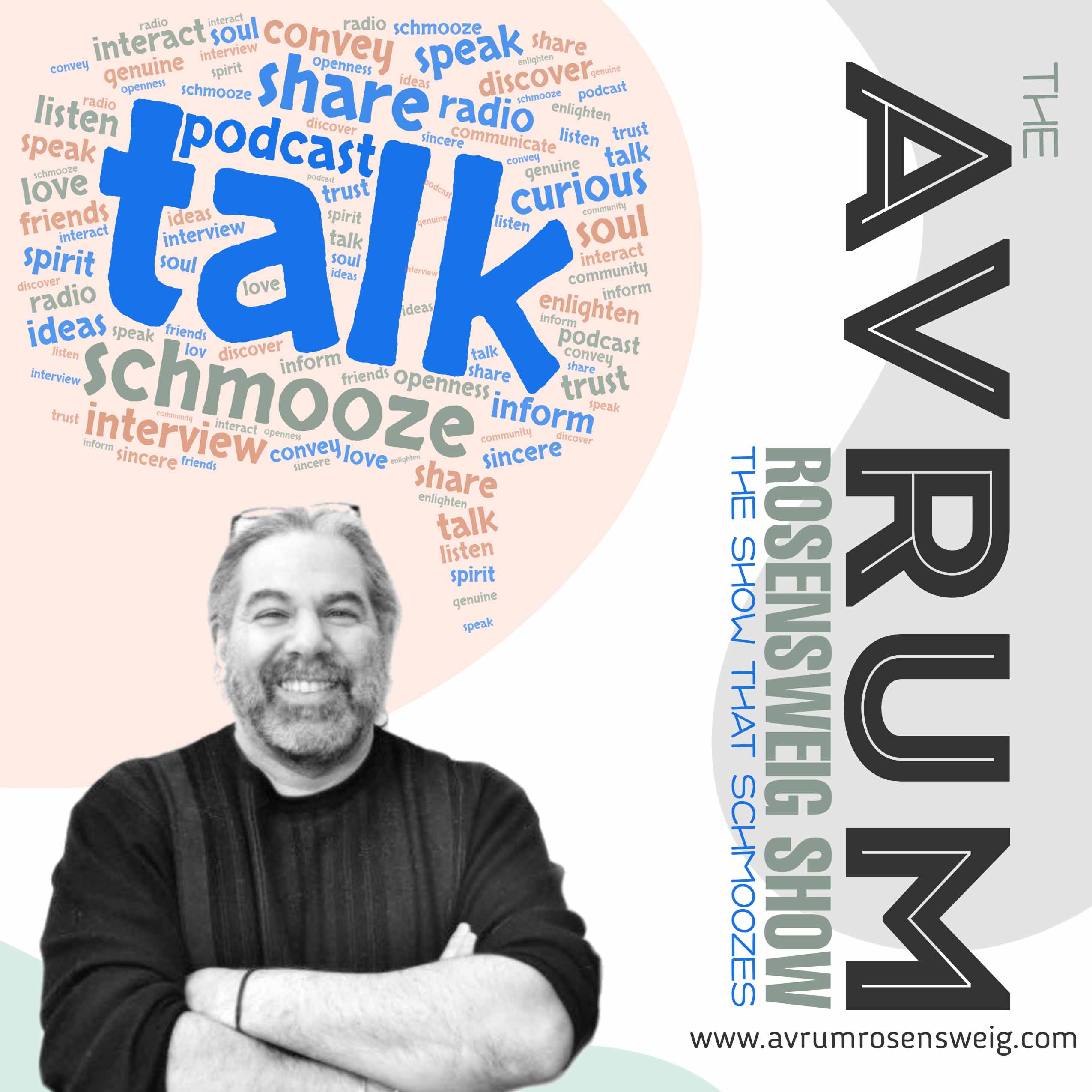
26.1K
Downloads
399
Episodes
The Avrum Rosensweig Show is a unique and intimate schmooze-fest with celebrity host, Avrum Rosensweig, who draws out secrets, dreams and inner most thoughts of plumbers, food servers, crossing guards, stars, celebrities and more. Nowadays, since the October 7th terrorist attack on southern Israel, Avrum is concentrating on Israel, and individuals who have a story to tell of courage and bravery about the days of the war.
Episodes
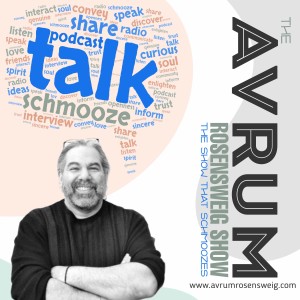
Sunday Jun 15, 2025
Sunday Jun 15, 2025
In this episode, I’m thrilled to schmooze with Sarah Landenwich, author of the gripping new novel 'The Fire Concerto'. This literary page-turner follows a brilliant female musician lost to history and another woman’s quest to ensure her legacy endures. Packed with tension, surprises, and vivid portrayals of the brutal realities faced by exceptionally talented women in the 19th century, the book is a tribute to forgotten female musicians, artists, and intellectuals—many of whom Sarah, a classically trained pianist, named her characters after. Hailing from Louisville, Kentucky, where she lives with her husband and daughter, Sarah brings her love of Romantic-period music to this mesmerizing debut. Lauren Belfeer, New York Times bestselling author of And After the Fire and Ashton Hall, calls it “a mesmerizing story of passion, suspense, and heartbreak” that lingers long after the final page. So, grab a seat, and let’s explore the music, history, and heart behind The Fire Concerto with Sarah Landenwich!

Sunday Jun 15, 2025
Sunday Jun 15, 2025
In this episode, I’m thrilled to schmooze with Sarah Landenwich, author of the gripping new novel 'The Fire Concerto'. This literary page-turner follows a brilliant female musician lost to history and another woman’s quest to ensure her legacy endures. Packed with tension, surprises, and vivid portrayals of the brutal realities faced by exceptionally talented women in the 19th century, the book is a tribute to forgotten female musicians, artists, and intellectuals—many of whom Sarah, a classically trained pianist, named her characters after. Hailing from Louisville, Kentucky, where she lives with her husband and daughter, Sarah brings her love of Romantic-period music to this mesmerizing debut. Lauren Belfeer, New York Times bestselling author of And After the Fire and Ashton Hall, calls it “a mesmerizing story of passion, suspense, and heartbreak” that lingers long after the final page. So, grab a seat, and let’s explore the music, history, and heart behind The Fire Concerto with Sarah Landenwich!

Friday Jun 13, 2025
PARSHA & PROSE WITH RABBI SHLOMO GEMARA, ON BEHALOTCHA (Audio)
Friday Jun 13, 2025
Friday Jun 13, 2025
Join me on Parsha and Prose for a dynamic conversation with Rabbi Shlomo Gemara, as we explore vital issues facing the Jewish people, Israel, and our community through the lens of Torah and literature. In this episode, we dive into the Torah portion Behalotcha, discussing the Haredi community’s role in the Israel Defense Forces, with Rabbi Gemara emphasizing the unity of all Jews in defending our people during challenging times. We also reflect on important issues within the parsha including: Miriam and Aaron’s lashon hara (gossip) against Moshe\;, exploring how guarding our speech fosters moral integrity. Rabbi Gemara illuminates the menorah as a symbol of Jewish light, alongside the trumpet and manna, weaving a tapestry of spiritual resilience and meaning. This action-packed episode is a call to pride and purpose—Am Yisrael Chai! Subscribe, comment, and join us in celebrating Jewish wisdom and our beautiful peoplehood.
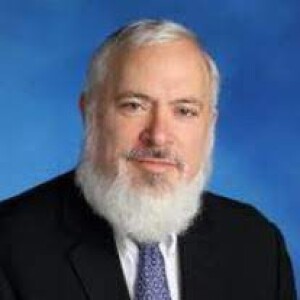
Friday Jun 13, 2025
PARSHA & PROSE WITH RABBI SHLOMO GEMARA, ON BEHALOTCHA (Audio/Visual)
Friday Jun 13, 2025
Friday Jun 13, 2025
Join me on Parsha and Prose for a dynamic conversation with Rabbi Shlomo Gemara, as we explore vital issues facing the Jewish people, Israel, and our community through the lens of Torah and literature. In this episode, we dive into the Torah portion Behalotcha, discussing the Haredi community’s role in the Israel Defense Forces, with Rabbi Gemara emphasizing the unity of all Jews in defending our people during challenging times. We also reflect on important issues within the parsha including: Miriam and Aaron’s lashon hara (gossip) against Moshe\;, exploring how guarding our speech fosters moral integrity. Rabbi Gemara illuminates the menorah as a symbol of Jewish light, alongside the trumpet and manna, weaving a tapestry of spiritual resilience and meaning. This action-packed episode is a call to pride and purpose—Am Yisrael Chai! Subscribe, comment, and join us in celebrating Jewish wisdom and our beautiful peoplehood.
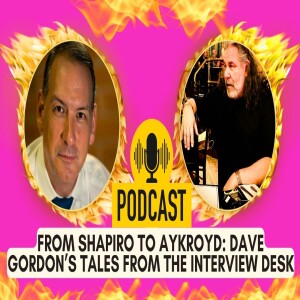
Tuesday Jun 10, 2025
Tuesday Jun 10, 2025
Join us for an insightful and wide-ranging conversation with Dave Gordon—veteran writer, editor, communications strategist, and host of the acclaimed Insights and Influence podcast. With over 25 years in media, Dave has published thousands of pieces across politics, travel, business, arts, lifestyle, and beyond. He's interviewed icons like Gene Simmons, Dan Aykroyd, Rick Moranis, Matisyahu, Isiah Thomas, and Kiefer Sutherland, and his byline appears in top publications including: 🗞️ BBC 🗞️ The Globe and Mail 🗞️ National Post 🗞️ New York Times 🗞️ Washington Times 🗞️ The Times of Israel 🗞️ The Guardian …And many more. 💬 In This Episode, We Discuss: ⏩ Dave’s approach to writing across genres and platforms ⏩ The power of strategic communication in business and advocacy ⏩ Behind the scenes of high-profile interviews ⏩ Navigating modern media with authenticity and intention ⏩ Dave’s personal mission to combat antisemitism and amplify Jewish identity ⏩ How he blends his professional expertise with passionate activism 🕍 A Proud Jewish Voice Dave speaks candidly about his Yiddishkeit and deep connection to the Jewish community. From standing against rising antisemitism to strengthening support for Israel, his voice is a rallying cry for integrity, courage, and cultural pride. 📌 Resources & Connect: 📚 Read Dave’s work: [YourWebsiteHere.com] 🎧 Listen to Insights and Influence Podcast 📲 Follow Dave on [Twitter] [LinkedIn] [Instagram] 📰 Publications: BBC, NYT, National Post, Times of Israel, and more

Monday Jun 09, 2025
THE TEACHER OF AUSCHWITZ: A NOVEL ABOUT THE HEROIC FREDY HIRSCH (Audio)
Monday Jun 09, 2025
Monday Jun 09, 2025
Watch this episode with Wendy Holden, the author of 'The Teacher of Aushwitz' a stirring, sad, hopeful novel about a 28 year old gay Jewish inmate of Auschwitz who started up a children's barrick in the concentration camp to teach the children how to deal with the barbarism of their environment, and learn studies and creativity. Fredy was able to open the school through courageous negotiations with the SS, including Joseph Mengele. Wendy, a former war correspondent, is a magnificent author (of over 40 books) and guest. I enjoyed my time with her so much, her stories, her insights and her unparalleled positivity about human nature. Wendy is highly inspiring.
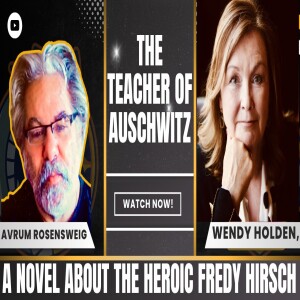
Monday Jun 09, 2025
Monday Jun 09, 2025
Watch this episode with Wendy Holden, the author of 'The Teacher of Aushwitz' a stirring, sad, hopeful novel about a 28 year old gay Jewish inmate of Auschwitz who started up a children's barrick in the concentration camp to teach the children how to deal with the barbarism of their environment, and learn studies and creativity. Fredy was able to open the school through courageous negotiations with the SS, including Joseph Mengele. Wendy, a former war correspondent, is a magnificent author (of over 40 books) and guest. I enjoyed my time with her so much, her stories, her insights and her unparalleled positivity about human nature. Wendy is highly inspiring.

Sunday Jun 08, 2025
PARSHA AND PROSE: NASO & ANNA KARENINA (Audio)
Sunday Jun 08, 2025
Sunday Jun 08, 2025
In this week's Parsha and Prose, we journey through Parshat Naso (Numbers 4:21–7:89) and find rich parallels in Leo Tolstoy’s literary masterpiece, Anna Karenina. What do a Torah portion about vows, purity, and priestly blessings have in common with a 19th-century Russian novel? More than you think. 💬 From the Sotah ritual that examines marital suspicion to the Nazirite vow of sacred discipline, we explore how Torah law and Tolstoy’s narrative both grapple with love, trust, spiritual purpose, and societal norms. 🔍 In This Episode: ✨ The tragic arc of Anna Karenina vs. the moral boundaries in Parshat Naso ✨ Levin’s spiritual awakening and the Nazirite’s vow of devotion ✨ How suspicion, shame, and sanctity intertwine in both texts ✨ The priestly blessings and the universal longing for peace, grace, and connection 📚 Why This Matters: Both Torah and classic literature reflect our deepest human tensions—desire vs. duty, individuality vs. community, and chaos vs. order. This episode invites you to wrestle with those questions and discover timeless insights for modern life. 🕊️ Perfect for: → Lovers of Torah and literature → Students of ethics, psychology, and spirituality → Anyone navigating love, responsibility, and personal growth 🔗 Resources & Links: 🌐 More episodes of Parsha & Prose → [Insert Link] 📝 Weekly Torah insights newsletter → [Insert Link] 🎧 Subscribe to the podcast: [Spotify] [Apple] [RSS]

Sunday Jun 08, 2025
PARSHA AND PROSE: NASO & ANNA KARENINA (Audio/Visual)
Sunday Jun 08, 2025
Sunday Jun 08, 2025
In this week's Parsha and Prose, we journey through Parshat Naso (Numbers 4:21–7:89) and find rich parallels in Leo Tolstoy’s literary masterpiece, Anna Karenina. What do a Torah portion about vows, purity, and priestly blessings have in common with a 19th-century Russian novel? More than you think. 💬 From the Sotah ritual that examines marital suspicion to the Nazirite vow of sacred discipline, we explore how Torah law and Tolstoy’s narrative both grapple with love, trust, spiritual purpose, and societal norms. 🔍 In This Episode: ✨ The tragic arc of Anna Karenina vs. the moral boundaries in Parshat Naso ✨ Levin’s spiritual awakening and the Nazirite’s vow of devotion ✨ How suspicion, shame, and sanctity intertwine in both texts ✨ The priestly blessings and the universal longing for peace, grace, and connection 📚 Why This Matters: Both Torah and classic literature reflect our deepest human tensions—desire vs. duty, individuality vs. community, and chaos vs. order. This episode invites you to wrestle with those questions and discover timeless insights for modern life. 🕊️ Perfect for: → Lovers of Torah and literature → Students of ethics, psychology, and spirituality → Anyone navigating love, responsibility, and personal growth 🔗 Resources & Links: 🌐 More episodes of Parsha & Prose → [Insert Link] 📝 Weekly Torah insights newsletter → [Insert Link] 🎧 Subscribe to the podcast: [Spotify] [Apple] [RSS]

Wednesday Jun 04, 2025
A SURPRISING INTERVIEW WITH 2 CANADIAN JEWISH PROFESSORS (Audio)
Wednesday Jun 04, 2025
Wednesday Jun 04, 2025
Professors David Koffman (York University) and Norm Ravvin (Concordia University) share insights into their roles as Jewish educators on contemporary Canadian campuses and discuss the work of the Association for Canadian Jewish Studies (ACJS). They challenge the perception that university campuses are uniformly "woke" or inherently unsafe for Jewish students, offering a nuanced perspective on the experiences of Jewish students today. Tune in to explore their views, engage with their arguments, or connect to share your own perspective. Learn more about the ACJS, its journal, programs, and its mission to foster scholarship on Canadian Jewish history and culture at 👉 https://acjs-aejc.ca/.
